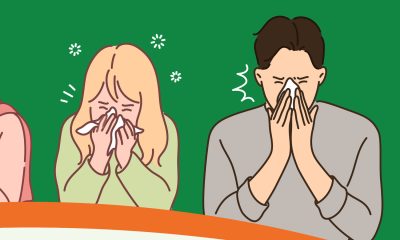Good news for long Covid sufferers
Vaccinated people, in particular, were at lower risk of breathing difficulties.
Published
1 year ago onBy
Talker NewsBy Stephen Beech via SWNS
Most 'long Covid' effects clear up within a year following mild infection, according to new research.

(Blue Titan via Shutterstock)
A relatively mild dose of the virus does not lead to substantial long-term illness in most infected people, say scientists.
The findings, published by The BMJ, show that most symptoms that develop after mild COVID-19 infection linger for several months, but return to normal within 12 months.
Vaccinated people, in particular, were at lower risk of breathing difficulties - the most common effect to develop after mild infection - compared with the unvaccinated.
The findings of the major Israeli study suggest that, although the long Covid phenomenon has been feared and discussed since the beginning of the pandemic, the vast majority of mild disease cases do not suffer serious or chronic long-term illness.
Long Covid is defined as symptoms persisting or new symptoms appearing more than four weeks after the initial infection.
In March last year, an estimated 1.5 million people in the UK - 2.4 percent of the population, or around one in 40 people - reported long Covid symptoms, mainly fatigue, shortness of breath, loss of smell, loss of taste, and difficulty concentrating.
But the clinical effects of long Covid one year after mild infection and their association with age, sex, COVID-19 variants, and vaccination status were still unclear.
The Israeli research team compared the health of uninfected people with those who had recovered from mild COVID-19 for a year after infection.
They used electronic records of a public healthcare organization in Israel, in which almost two million members were tested for COVID-19 between March 1, 2020, and October 1, 2021.
More than 70 long Covid conditions were analyzed in a group of infected and matched uninfected members with an average age of 25.
The researchers compared conditions in unvaccinated people, with and without COVID-19 infection, controlling for age, sex and COVID-19 variants, during early (30 to 180 days) and late (180 to 360 days) time periods after infection.
Conditions in vaccinated compared to unvaccinated people with COVID-19 were also compared over the same time periods.
To ensure only mild disease was assessed, the team excluded patients admitted to hospitals with more serious illnesses. Other potentially influential factors - such as alcohol intake, smoking, socio-economic status, and a range of pre-existing chronic conditions - were also taken into account.
The researchers found that COVID-19 infection was "significantly associated" with increased risks of several conditions including loss of smell and taste, concentration and memory impairment, breathing difficulties, weakness, palpitations, streptococcal tonsillitis and dizziness in both early and late time periods.
Hair loss, chest pain, cough, muscle aches and pains and respiratory disorders resolved in the late period.
For example, compared with non-infected people, mild COVID-19 infection was associated with a 4.5-fold higher risk of smell and taste loss in the early period and an almost three-fold higher risk in the later period.
The findings showed that the overall burden of conditions after infection across the 12-month study period was highest for weakness and breathing difficulties.
Study author Dr. Maytal Bivas-Benita said that when conditions were assessed by age, breathing difficulties were the most common, appearing in five of the six age groups but remaining persistent throughout the first year post-infection in the 19 to 40, 41 to 60, and over 60 years age groups.
She said weakness appeared in four of the six age groups and remained persistent in the late phase only in the 19 to 40 and 41 to 60 age groups.
Dr. Bivas-Benita, a senior Researcher at KI Research Institute in Israel, said: "Male and female patients showed minor differences, and children had fewer outcomes than adults during the early phase of COVID-19, which mostly resolved in the late period.
"Findings were similar across the wild-type, Alpha and Delta COVID-19 variants.
"Vaccinated people who became infected had a lower risk of breathing difficulties and similar risk for other conditions compared with unvaccinated infected patients"
She said it can’t be ruled out that COVID-19 patients may use healthcare services more frequently, resulting in higher reporting and increased screening for potential virus-related symptoms.
However, Dr. Bivas-Benita said the research involved a large detailed analysis of health records across a diverse population, representing one of the longest follow-up studies in patients with mild COVID-19 to date.
And findings should apply to similar western populations worldwide.
She added: “Our study suggests that mild COVID-19 patients are at risk for a small number of health outcomes and most of them are resolved within a year from diagnosis.
“Importantly, the risk for lingering dyspnoea was reduced in vaccinated patients with breakthrough infection compared with unvaccinated people, while risks of all other outcomes were comparable."
Stories and infographics by ‘Talker Research’ are available to download & ready to use. Stories and videos by ‘Talker News’ are managed by SWNS. To license content for editorial or commercial use and to see the full scope of SWNS content, please email [email protected] or submit an inquiry via our contact form.
You may like


Blood test can detect signs of knee condition 8 years before X-rays


Rare condition that stunts growth also reduces heart attack risk


Research reveals mice think just like human babies


Harvard study reveals how pollution raises risk of heart attack or stroke


Does taking the stairs instead of an elevator help you live longer?


Dog theft causes same emotional turmoil as losing a child: study
Other Stories


Blood test can detect signs of knee condition 8 years before X-rays
Early detection could lead to treatments that slow the progression of the most common form of arthritis.


Man captures ultra rare albino squirrel on camera
The white squirrel has red eyes so is thought to be an albino squirrel.


Adorable dog kicks his leg while he walks
A video captured the pup bouncing along the street of his native China.


Woman with rare ‘Sleeping Beauty’ condition sleeps every four hours
She was diagnosed at age 18 after years of struggling to stay awake in school and nodding off during class.


97-year-old veteran receives WWII service medal 80 years later
"We’re all so proud of Eve."
Top Talkers

 Health6 days ago
Health6 days agoNew study reveals ‘old age’ begins later than it used to

 Animals2 days ago
Animals2 days agoAdorable dog kicks his leg while he walks

 Wildlife5 days ago
Wildlife5 days agoClever elephant returns visitor’s shoe that fell into enclosure

 Lifestyle1 week ago
Lifestyle1 week agoWoman regrets her tattoo nightmare: ‘It’s horrendous’

 Good News6 days ago
Good News6 days agoDisabled student takes first steps in 10 years on graduation stage

 Entertainment3 days ago
Entertainment3 days agoWhat is the perfect movie length?

 Broadcast2 days ago
Broadcast2 days agoAre allergies interfering with your social life?

 Animals2 days ago
Animals2 days agoMan captures ultra rare albino squirrel on camera
